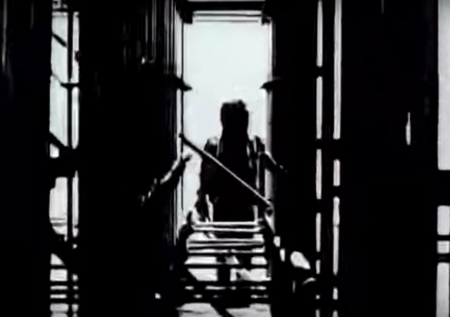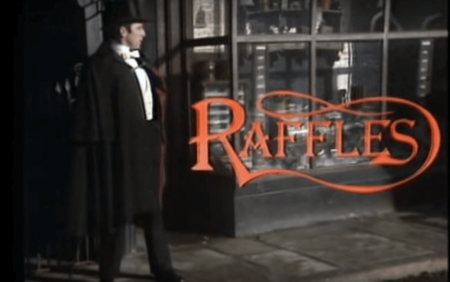One of the most fascinating techniques that I’ve acquired from my limited exploits in academia has been that of a “reading” of a single programme – arguments (not my strong point, as you know) and deductions made purely from the text under observation. From my own perspective, it often allows me to see things that I’ve seen analysed and discussed to the point of extinction in their own horizon-locked fan cultures from a new and exciting perspective.
A superb example of this came up recently when I was dipping into Back in Time for TV – a blog by HE Cooper [i], the title of which riffs off BBC Two’s looks at twentieth century lifestyles such as Back in Time for Dinner (2015) and Back in Time for the Weekend (2016). I don’t naturally read blogs – many previous examples that I’d attempted had either been geared towards self-promotion (a necessity for survival in the online world we find ourselves in here in The Future) or had attempted such long stretches of similar subject matter that they soon became as predictable as me telling people that [The] Naked City (1958-1963) was the best TV show ever [ii].
What HE Cooper is doing is to understand and experience British television since 1960 by – for me – a rather innovative approach. Making full use of the rich array of history now available in terms of scheduling information and programming itself, she identifies a representative week from the given year to drop in on, and then selects around half a dozen broadcasts from that seven day period to study. Could be a drama. Could be a comedy. Maybe an import. Possibly a serving of current affairs with a side order of soap, all wrapped up with a bit of music or sport. Some brandings she is familiar with – others are utterly new to her. And that’s where my delight really starts…
One of the entries that made me sit up and take notice was when HE landed in February 1976 and tuned in for an episode of Thames Television’s juvenile telefantasy offering, The Tomorrow People (1973-1979 and some other years too complex to go into here…). Now, I had witnessed young Stephen Jameson ‘breaking out’ into the next stage of human evolution at around 4.50pm on 30 April 1973. I’d seen him rescued from the clutches of Jedikiah by John and the other homo superior. I knew that the Lab was built in an abandoned part of the London Underground. I knew about TIM, the biotronic computer. I’d seen Stephen and John rescue student teacher Elizabeth M’Bondo when she broke out in the classroom and jaunted into the dangers of hyperspace. Just weeks earlier, I’d seen cocky Mike Bell hover on the edges of a life of crime before learning the responsibility of his special powers from his new friends. I bought Look-in and read its colourful Tomorrow People comic strips bursting with the energetic illustrations of John M Burns, and I eagerly awaited each new paperback tie-in from Piccolo.
But HE didn’t know any of this. She’d not been on these adventures. And that was what made her reading of the opening episode of the serial Into the Unknown so utterly exciting. Possibly more exciting than when I watched it at the time.
I’d never realised before that unless you knew the format of The Tomorrow People, you were likely to be totally and utterly lost when watching a random episode. This wasn’t a series like Z Cars (1962-1978) where within minutes you can fundamentally understand who are the cops and who are the robbers, or The Six Million Dollar Man (1973-1978) where Steve Austin’s crash in the HL-10 and the process in which he was ‘rebuilt’ to be ‘better… stronger… faster’ was reiterated in the weekly opening titles. The opening of The Tomorrow People bombarded the unsuspecting viewer with abstract monochrome images, smashing out of the TV screen into the living room in time to Dudley Simpson’s pulse-racing synth-driven theme tune. And HE’s reading of this sample episode packed every bit as much of a punch when it offered me something utterly new on a show that I thought had been documented to death.

Fig 2: No idea [iii]
… but not at Back in Time for TV. HE casts her net wider and snares more interesting subjects. I whoop with delight when she materialises in March 1977 for a Friday night feast of Raffles (1977), Yorkshire television’s adaptations of the escapades of EW Hornung’s gentleman thief. For me, this is a cherished televisual memory that only about three people have ever discussed with me in the four decades since its first airing. And yet here is somebody prepared to delve beyond the obvious in her understanding of how television has grown and developed. She was already keen to experience more of the show’s star Anthony Valentine having seen him in Callan [iv] and she’s quickly captivated by this deft blend of light-hearted fun and deadly danger.
And that makes me love it all the more.
There’s also encounters with shows that I’ve still never seen that much of. Remaining in 1977, there’s a mission for the Royal Flying Corps in Wings (1977-1978) that is described in such an engaging manner and with such an understanding of period programming production that I make a mental note to look out for the DVD on the next visit to CeX.
But it’s not just HE’s range of subjects. The more I read, the more I am educated by the researches emerging from her ‘reading’. Was that the school-leaving age at the time? How wide was the spread of second sets? Could you tackle that sort of subject before the watershed? Good questions and great answers!
This is seriously enjoyable stuff. It’s readings, but with such a sense of delight, engagement and fun that I feel so envious that I’m not navigating these backwaters of television for the first time as well.
And I’m utterly charmed that HE should even be bothered to look at these happy memories from my formative years, and present us with such lovely readings to read. [v]
_________________________________________________________________________________
Andrew Pixley is a retired data developer. For the last 30 years he’s written about almost anything to do with television if people will pay him – and occasionally when they won’t. And – s*d it – he and his wife will probably now have to go out now and get the Simply DVD set of Wings…
Footnotes
[i] Who will hereafter be referred to as ‘HE’ because those are her initials. I realise that for those of you in academia tuned to read this as ‘Higher Education’ that this could be a tad distracting, but I’m sure you’ll be able to live with the inconvenience for the next 983 words. And when I get to the bit a little later on where I am referring to ‘Higher Education’, then I shall write out ‘Higher Education’ to avoid any confusion.
[ii] … this week.
[iii] And it’s no good looking down here either.
[iv] See, it is a good day.
[v] And it turns out that I didn’t need to refer to ‘Higher Education’ after all. Okay – panic over.








A very interesting piece, Andrew! I want to thank you for pointing me to HE’s “Back in Time for TV” series…it’s been fun and fascinating reading. I love reading and discussing archive television from both the U.K. and the U.S., and it’s always a treat to see people such as yourself, or like HE, who didn’t see these shows “live,” discuss the subject with such warmth and curiosity.
Thank you for finding the time to leave such a kind comment Jeff – much appreciated. And thank you also for the generous sentiments about the Network viewing notes at the Home Theater Forum as well – viewing notes are a weird thing, and I’m hoping that Kim and Tobias will accept a piece about them for publication here in due course.
I see from your own on-line postings and pieces of prose that you have a wonderfully wide range of film and TV interests. How brilliant! And it’s always good to see enthusiasm and analysis for some of these gems from the past. We now live in a time when there’s so much “new” stuff, that even some of the bigger archival brandings are starting to get left behind.
And I’m so pleased that you’ve enjoyed HE’s blogs as well. The scope of what they embrace is quite brilliant – and the sense of freedom which they were written with reminded me so strongly of writing fanzines in the 1980s at just the same moment as I happened to contact Kim about all the great work being done here at CSTonline. And as CSTonline wasn’t connected to a single programme or a single genre of television, I suddenly realised that it could offer me the same sort of exhilarating freedom that I remember with my first dabblings in fandom.
I think your use of the word “curiosity” is a particularly astute one – I know that I’ve always become curious about some new, tangential show to one that I’m studying and how it may have influenced or been influenced by whatever I’m researching… and that it may lead to something just as fascinating. In recent years, my delight at *finally* getting to see “The Rogues” led me to sampling more examples of the Four Star back catalogue… and if it hadn’t been for that I’d never have seen “Saints and Sinners” which is an equally effective series but for totally different reasons.
Anyway, thanks for your time and trouble. Let HE know how much you’re enjoying “Back in Time for TV” as well. 🙂
All the best
Andrew
Thank you very much for the reply, Andrew, most kind! I am glad to see you find a home here at CSTonline, as I always very much enjoy reading your thoughts on archive television and related matters. I certainly understand what you mean, about having a platform where you don’t have to specialize in only one programme or topic, but can muse upon a wide variety of subjects as the mood strikes.
I was pleased to see that your interest and passion for vintage TV also extended to our humble U.S. variety, referenced in various comments you’ve made about the great Naked City (are you a fan of Route 66 as well? A very impressive production for the time, that was…), The Fugitive, etc. There is so much of value in television’s past on both sides of the Pond…I must confess that – although I do find many modern TV dramas interesting and do my best to keep up with a number of them – I’m finding more and more enjoyment wallowing in the television made between 1955 and 1985. There’s just something about it that really appeals to me. And it’s not just because I’m becoming increasingly advanced in years (being born in 1967, just a few weeks after Man in a Suitcase premiered in the UK)…there’s just something about the style of storytelling, production and acting that I find particularly engaging about these older shows. It’s a real treat to read work by someone such as yourself covers these programmes with so much enthusiasm and expertise. Please keep doing what you’re doing and I (and many others) will keep reading!
P.S. Thanks also for turning me on to the Benji and Nick Show cult TV podcast (recommended by you on a thread on Gallifrey Base). What a great listen, and the types of programmes they discuss are right up my street.
Hello Jeff 🙂
Yes – CSTonline is a very nice place to submit to. Knowing that Kim and Tobias are nice people to work with who will ask good questions and present things looking at their best makes it a real pleasure to contribute.
I honestly wish that I had more time to experience far more global television – my wife and I have followed various shows from Australia, New Zealand, Germany, France, Italy, Denmark and many other countries in recent years in addition to our usual diet of UK and imported US shows on the UK Freeview channels. Through much of my childhood, I was fooled into believing that US imports had little or no value – something which I reacted against so badly it formed the basis of my MRes.
So far, I’ve only seen a single episode of “Route 66” during the re-runs in London during the late 1980s – but it’s likely that I’ll try to acquire the set in due course as it seems to be the natural successor to the approach taken in “Naked City”.
I think we’re pretty much split between new and archival shows. For every “Naked City” we’ll be watching a “Shakespeare & Hathaway”, for every animated “Star Trek” we’ll keep a date with “Discovery”. My feeling is that TV producers are just as capable of making good and/or bad shows now as they were in the 1950s, and it’s a matter of seeking out the exceptionally enjoyable ones to savour, and then hopefully share one’s passion for to the right audience in an accessible manner.
Glad you’ve found “The Benji and Nick Show” to be of interest. The real value for me is when they’ve had the time to really watch quite a bit of a different show and then convey their enthusiasm for it to the listeners.
All the best
Andrew
Oooohhh… how narrow can I make this go?
Look, I’ll post that last bit again in a separate thread so that you can read it more easily…
Reposting for issues of greater width:
Hello Jeff
Yes – CSTonline is a very nice place to submit to. Knowing that Kim and Tobias are nice people to work with who will ask good questions and present things looking at their best makes it a real pleasure to contribute.
I honestly wish that I had more time to experience far more global television – my wife and I have followed various shows from Australia, New Zealand, Germany, France, Italy, Denmark and many other countries in recent years in addition to our usual diet of UK and imported US shows on the UK Freeview channels. Through much of my childhood, I was fooled into believing that US imports had little or no value – something which I reacted against so badly it formed the basis of my MRes.
So far, I’ve only seen a single episode of “Route 66” during the re-runs in London during the late 1980s – but it’s likely that I’ll try to acquire the set in due course as it seems to be the natural successor to the approach taken in “Naked City”.
I think we’re pretty much split between new and archival shows. For every “Naked City” we’ll be watching a “Shakespeare & Hathaway”, for every animated “Star Trek” we’ll keep a date with “Discovery”. My feeling is that TV producers are just as capable of making good and/or bad shows now as they were in the 1950s, and it’s a matter of seeking out the exceptionally enjoyable ones to savour, and then hopefully share one’s passion for to the right audience in an accessible manner.
Glad you’ve found “The Benji and Nick Show” to be of interest. The real value for me is when they’ve had the time to really watch quite a bit of a different show and then convey their enthusiasm for it to the listeners.
All the best
Andrew